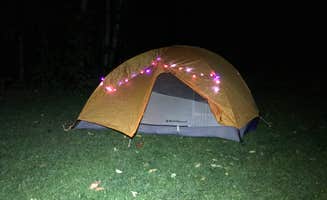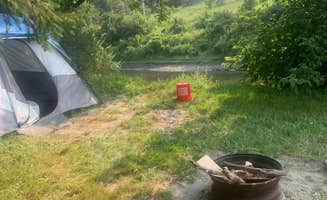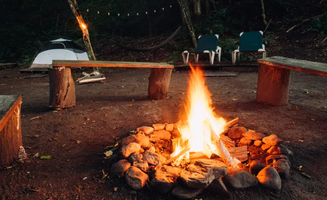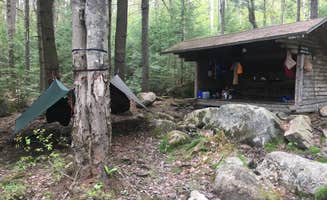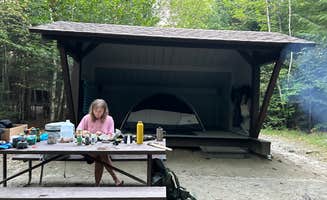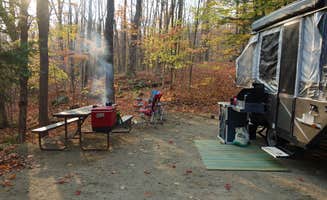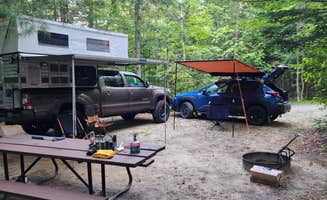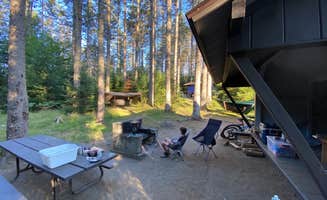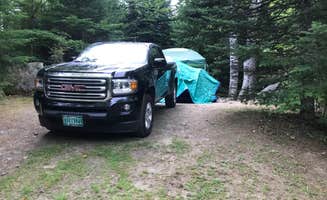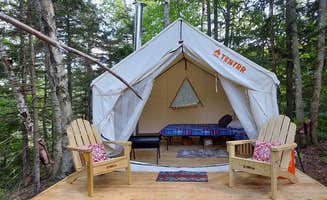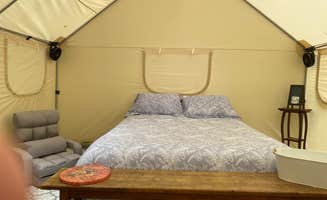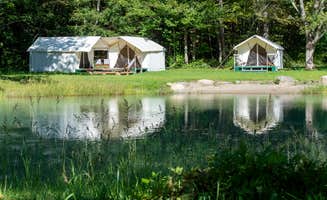Vermont's Groton State Forest, a 25,000-acre protected woodland near Barre, contains multiple camping options within a 20-mile radius. The region's camping season typically runs from mid-May through mid-October, with most facilities closing after Indigenous Peoples' Day weekend. Summer temperatures average 70-80°F during daytime, while spring and fall visitors should prepare for overnight temperatures that can drop into the 40s.
What to do
Paddling opportunities: Ricker Pond State Park offers non-motorized paddling on a serene pond. "The pond is serene and a great place to swim, paddle, explore, and fish. If you paddle or swim to the other side of the camp ground, there is a huge rock with a rope swing," notes a visitor to Ricker Pond State Park.
Rail trail access: Several campgrounds connect directly to the Cross Vermont Trail. At Kettle Pond State Park, campers enjoy this multi-use path. "We took a half day bike trip on it one day to go to the town of Marshfield to visit Rainbow Sweets, home of some of the best French pastries in Vermont," shares a reviewer.
Historical exploration: Hiking trails in the Groton State Forest reveal remnants of past settlements. At Little River State Park, "the hiking trails are really good--the actually pretty steep. There are lots of old foundations hidden on the trails that are fun to discover," according to one visitor.
What campers like
Remote water access: For those seeking solitude, several parks offer boat-in or hike-in sites. "Remote campsite #9 was a bit wet this spring but in truth everything has been wet here in Vermont this year. 3 night get away with son, and first time on Kettle pond," reports a visitor who appreciated the isolated experience at Kettle Pond State Park.
Lean-to accommodations: Many campsites near Barre feature traditional covered shelters. At Big Deer State Park, "lean-tos are large enough to accommodate 2 moderately sized free-standing tents (2-4 person, depending on the style). All sites have standard fire rings and large picnic tables."
Cell service limitations: Many campers appreciate the limited connectivity. "There is absolutely no cell service for miles, so plan accordingly," notes a Ricker Pond visitor, while another camper at Kettle Pond mentioned this helped their family disconnect during their stay.
What you should know
Reservation requirements: Most state parks fill quickly, especially for premium sites. "I've been visiting Ricker Pond for nearly 20 years (except for the years that I don't book enough in advance and aren't able to secure a spot for my desired length of stay). My favorite lean to site is directly on the water, private, and fills up fast," advises one regular visitor.
Access challenges: Some campgrounds have difficult entrances for larger vehicles. At Onion River Campground, "you need to go over a bridge in order to get to the campground which is ridiculously narrow and there are terrible potholes. Our 42 foot fifth wheel barely made it in."
Water considerations: Drinking water availability varies between parks. Kettle Pond has no running water, requiring campers to bring containers or filtration systems. Meanwhile, Little River offers potable water but with unthreaded spigots. "The spigots for the water are not threaded. We tried our water bandit, with messy wet results," reports a camper.
Tips for camping with families
Swimming options: Several parks offer designated swimming areas. "The lake water was beautiful and clear. There was enough sand at the camper beach for sand castles and other beach games," writes a visitor to Stillwater State Park, though they noted seeing "a few leeches here and there--none right at the swimming area, but more to the side, close to the vegetated areas."
Wildlife viewing: Children can observe various animals in natural settings. At Kettle Pond, one family enjoyed watching "the Loons teaching it's chicks to hunt for food," while another noted, "We were able to watch the Loons teaching its chicks to hunt for food. A bit of work to get to this site but every bit worth the trade off for peace n quiet!"
Ranger programs: State parks often offer educational activities. One Stillwater visitor reported, "On our second day, there was an interpretive program at the the pavilion. The ranger led visitors in making bark boats out of materials found in the park. The project was a great idea, as the kids could test their boats right there in the lake."
Tips from RVers
Campsite surface variations: RV sites range from gravel to grass. At Lazy Lions Campground, a visitor noted, "Gravel roads and relatively level gravel sites. The FHUs were in good order. Slightly low water pressure."
Size restrictions: Many campgrounds have limited space for large rigs. "This is a small campground, just outside of Montpellier VT," explains an Onion River camper. "The sites are all grass, but even with a little rain overnight, we had no problem getting out."
Hook-up availability: Full hook-ups are limited in the region. Stillwater State Park has no electric hookups, while Little River provides water but no electric. At Lazy Lions, "We had a pull through, and nice green grass sights," reports one RVer who appreciated the full-service sites.


